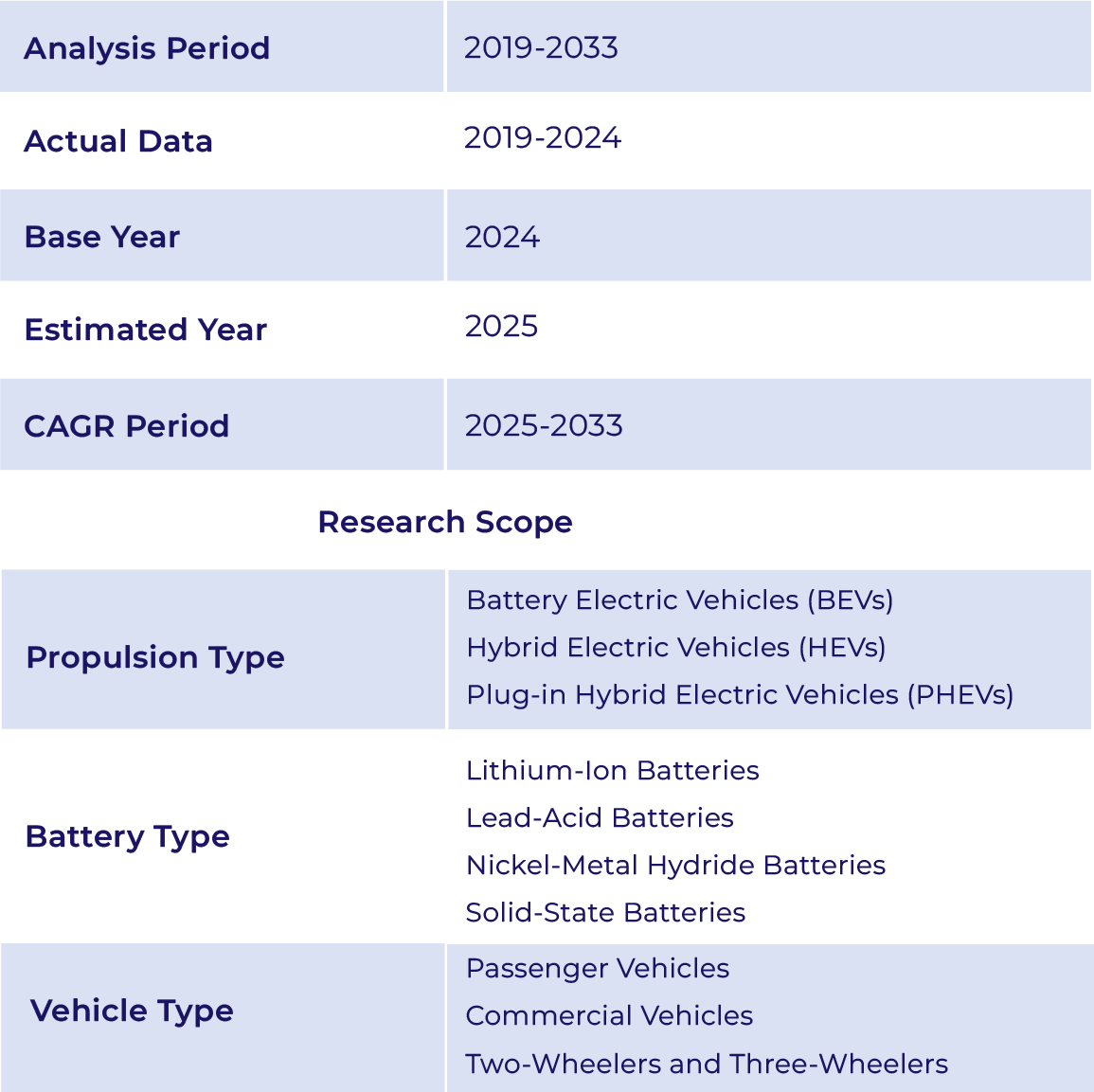Report Format:
![]()
![]() |
Pages: 110+
|
Pages: 110+
Thailand Electric Vehicle Battery Market Growth and Performance
- The Thailand EV battery market witnessed a significant year-on-year growth of XX% in 2024, with the market size reaching US$ XX million due to surging adoption of electric vehicles.
- It is projected to maintain steady momentum, growing at a CAGR of XX% and achieving an estimated market value of US$ XX million by 2033.
Thailand Electric Vehicle Battery Market Outlook
Thailand is making strong strides to become Southeast Asia’s EV manufacturing hub, anchored by government-led initiatives to promote EV adoption and local battery innovation. As of February 2024, the Thai government expanded its EV support scheme, providing incentives for battery electric vehicles (BEVs), motorcycles, and pickup trucks. These incentives are structured to reduce purchase prices and enhance EV affordability for consumers, while also encouraging manufacturers to localize battery production. The move reflects Thailand’s ambition to achieve 30% of total domestic vehicle production as zero-emission vehicles by 2030. This policy shift demonstrates a clear national commitment to electrification and environmental sustainability. The updated program also prioritizes collaboration with foreign automakers and battery firms to accelerate technology transfer and scale domestic capabilities. With this proactive policy framework in place, Thailand’s EV battery market is positioned for robust growth, reinforcing the country’s evolving role as a regional production and export center for electric mobility technologies.
Thailand Electric Vehicle Battery Market Drivers
A key market driver for Thailand’s EV battery sector is the newly introduced EV purchase subsidy scheme for 2024–2027, aimed at boosting both consumer adoption and local manufacturing. Under this plan, which complements the broader EV roadmap, eligible automakers receive subsidies based on vehicle types, production volumes, and localization levels. This dual-impact approach directly stimulates domestic demand while pushing battery and EV producers to set up local assembly and battery pack facilities. The scheme incentivizes companies to commit to Thailand not only as a sales market but also as a manufacturing base, reducing reliance on imported components and batteries. These policies signal a strategic effort by the Thai government to anchor long-term industrial development in the EV value chain. By focusing on homegrown capabilities, Thailand is working to reduce the cost of EVs, increase energy security, and create a sustainable ecosystem for electric mobility, ultimately enhancing its competitiveness in the global battery supply chain.
Thailand Electric Vehicle Battery Industry Trends
An important industry trend in Thailand EV battery landscape is the increasing influx of large-scale foreign investments, particularly from Chinese battery manufacturers. In March 2025, Thailand Board of Investment (BOI) approved Sunwoda’s US$1 billion investment in battery cell production facilities. Sunwoda plans to establish a comprehensive EV battery cell manufacturing base in Thailand to serve both domestic and ASEAN markets. This signals a growing trend where Thailand is not just a destination for EV assembly, but also an emerging hub for advanced component manufacturing. Sunwoda’s entry follows similar moves from other Chinese and Japanese battery players, reinforcing the trend of Thailand becoming a focal point in the regional EV battery supply chain. These investments are pivotal in strengthening domestic production capacities, advancing technological know-how, and creating skilled employment opportunities. The BOI’s endorsement also reflects confidence in Thailand’s policy stability and infrastructure readiness, paving the way for the nation to scale up its battery production capabilities to meet surging demand.
Thailand Electric Vehicle Battery Industry Development
Thailand’s EV battery market is evolving rapidly, with regulatory reforms driving technological and compliance-oriented changes across the industry. In April 2024, the Thai government introduced a new Battery Act, which mandates the registration and traceability of EV batteries throughout their lifecycle. The regulation compels manufacturers and recyclers to adhere to standardized guidelines covering battery design, reuse, and end-of-life disposal. This act serves multiple objectives: ensuring environmental protection, improving battery quality, and laying the foundation for a circular economy. The legislation also encourages the development of domestic recycling infrastructure, potentially attracting new players focused on battery recovery and second-life applications. By mandating comprehensive traceability, Thailand is preparing for the long-term sustainability of its EV ecosystem, while aligning with international best practices on battery stewardship. This progressive legal framework will help build consumer and investor confidence, essential for scaling both local and foreign investments in the EV battery value chain. The Act also supports Thailand’s ambition to be a responsible global player in green mobility.
Thailand Electric Vehicle Battery Market Scope







